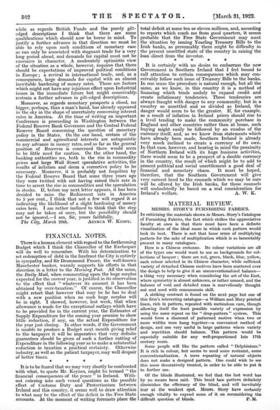FINANCIAL NOTES.
There is a human element with regard to the forthcoming Budget which I think the Chancellor of the Exchequer will do well to remember. With his determination to set redemption of debt in the forefront the City is entirely in sympathy, and Sir Drummond Fraser, the well-known Manchester banker, warmly supports his efforts in that direction in a letter to the Morning Post. All the same, the Daily Mail, when commenting upon the huge surplus expected for the current year, is justified in its observation to the effect that "whatever its amount it has been obtained by over-taxation." Of course, the Chancellor might retort that however that may be he has to deal with a new position when no such huge surplus will be in sight. I showed, however, last week, that when allowance is made for the exceptional outlays which have to be provided for in the current year, the Estimates of Supply Expenditure for the coming year promise to show little reduction, if any, on the actual Expenditure for the year just closing. In other words, if the Government is unable to produce a Budget next month giving relief to the taxpayer it will be imperative that very definite guarantees should be given of such a further cutting of Expenditure in the following year as to make a substantial reduction in taxation a practical certainty. Otherwise industry, as well as the patient taxpayer, may well despair of better times.
• It is to be feared that we may very shortly be confronted with what, to quote Mr. Keynes, might be termed "the financial consequences of the peace" in Ireland. With- out entering into such vexed questions as the possible effect of Customs Duty and Protectionism between Ireland and this country, it seems well to draw attention to what may be the effect of the deficit in the Free State accounts. At the moment of writing forecasts -place the total-deficit at some ten or eleven millions, and, according to reports which reach me from good quarters, it seems probable that the Free State Government may meet the situation by issuing Yearling Treasury Bills to the Irish banks, as presumably, there might be difficulty in the present unsettled state of the country in raising the loan direct from the investor.
It is certainly with no desire to embarrass the new Government in Southern Ireland that I feel bound to call attention to certain consequences which may con- ceivably follow such issue of Treasury Bills to the banks. In one sense the procedure is natural enough, but all the same, as we know, in this country it is a method of financing which tends unduly to expand credit and create inflationary tendencies. Those tendencies are always fraught with danger to any community, but in a country so unsettled and so divided as Ireland, the danger would seem to be the greater. It for example, as a result of inflation in Ireland prices should rise to a level tending to make the community purchase in England and other countries rather than at home, such buying might easily be followed by an exodus of the currency itself, and, as we know from statements which have already been made, Southern Ireland is already very much inclined to create a currency of its own. In that case, however, and bearing in mind the proximity of Northern Ireland with its huge business activities, there would seem to be a prospect of a-double currency in the country, the result of which might be to add to present political and social unsettlement a good deal of financial and monetary chaos. It must be hoped, therefore, that the Southern Government will give very earnest heed to the counsels which we may be sure will be offered by the Irish banks, for those counsels will undoubtedly be based on a real consideration for






































 Previous page
Previous page